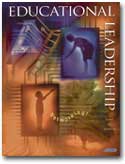Educational networks can involve a few teachers or students, or they can span vast distances and involve thousands of people. Educators pool their expertise and even share resources in grassroots groups, such as schools in England that respond to national restructuring (p. 72), as well as groups sponsored by umbrella organizations like Toronto's TeleLearning Research Network (p. 6). Most networks still rely on phones, publications, and meetings; but many groups are finding that disseminating and exchanging information electronically is cheaper and faster than print products or airfare.
The most exciting networking around is the electronic communication among students, teachers, parents, administrators, and, yes, education writers and editors. In assisting with the production of ASCD videos on educational technology, I have "talked" with educators at cutting- edge schools like Stevenson High School in Lincolnshire, Illinois, where teachers and students created a page called "Campaign '96." Another video-site school was Glen Grove Intermediate School in Glenview, Illinois, where students construct their own Web pages; see also the Bellingham, Washington, Public Schools (p. 30).
Other exciting networking news involves e-mail, electronic newsletters, and discussion groups. For example, I contribute to ASCD's electronic newsletter, the ASCD Education Bulletin; and I subscribe to several others, including PBS Online, from the Public Broadcasting Service. ASCD offers networking possibilities with interactive Web exchanges that feature lively comments on issues like block scheduling and school safety.
So far I have presented the rosy side of electronic networking. Many people have serious reservations about technology in education—particularly the Internet. How about equity? Many classrooms have no phones or computers, let alone access to the Internet. A partial answer is NetDay '96, a grassroots volunteer effort to wire at least five classrooms plus the library of every school in the United States this fall. Another way to approach equal access is through grant writing, collaborations, and reallocations of district budgets. Equity is serious business.
What of the future? What are some cautions? According to Bill Gates (1995), the Internet is not the Information Highway; it is a precursor. The real Highway will include unheard-of connections emanating from hardware yet to be invented. The future of networking will be marvelous indeed. But many people have doubts about the virtues of such a world—look at the dangers posed by current "chat rooms" and the addictions of virtual reality and gaming. People start worrying when it comes to their children and the Net.
Several articles in this issue rightly address these concerns, which, like free speech issues, will not be easily resolved. Parents and teachers ask other questions: "What's wrong with books?" and "How will the Internet help my child achieve in school?" "We want our children to have real, not virtual, experiences," they insist. The answers are in process, as this issue shows. Many students excel in language arts and research skills as they publish their works on the Web; others use local area networks to communicate with other students and access networked CD- ROMs to collaborate on projects. Through e-mail and listservs, mentors can work with students, universities can work with schools, and college students can take education courses online.
This issue explores other questions: What are the pros and cons of computer technology in education? Will computers and modems and electronic networks replace real teachers and classrooms? Gates has an answer for this, too: "The Information Highway won't replace or devalue any of the human educational talent needed for the challenges ahead: committed teachers, creative administrators, involved parents, and, of course, diligent students."
Here's a quote found on the Net: "If you think education's expensive, try ignorance." We cannot afford to be ignorant of all the networking possibilities out there, traditional as well as electronic.
